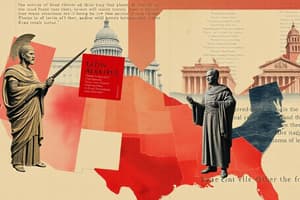Podcast
Questions and Answers
Which Roman official was responsible for maintaining public works?
Which Roman official was responsible for maintaining public works?
- Consul
- Aedilis (correct)
- Quaestor
- Eques
A 'cliēns' was an independent individual with no obligations to a 'patrōnus'.
A 'cliēns' was an independent individual with no obligations to a 'patrōnus'.
False (B)
What term describes the formal act of greeting or visiting someone of higher status in Roman society?
What term describes the formal act of greeting or visiting someone of higher status in Roman society?
salūtātiō
The two chief executive officials of the Roman Republic were known as the ______.
The two chief executive officials of the Roman Republic were known as the ______.
Match the Latin question word with its English translation:
Match the Latin question word with its English translation:
If someone 'praeficit' Marcus 'legionī', what is Marcus's new role?
If someone 'praeficit' Marcus 'legionī', what is Marcus's new role?
The term 'spolia' refers to voluntary contributions made by citizens to the Roman state.
The term 'spolia' refers to voluntary contributions made by citizens to the Roman state.
What is the term that describes a person of the common class or masses of Rome?
What is the term that describes a person of the common class or masses of Rome?
When introducing an indirect command, the conjunction 'ut' means ______.
When introducing an indirect command, the conjunction 'ut' means ______.
Which of the following is the best translation of the phrase 'grātiās agere'?
Which of the following is the best translation of the phrase 'grātiās agere'?
Flashcards
Aedilis
Aedilis
Public works official.
Arcus
Arcus
Bow; rainbow; arch.
Arx
Arx
Citadel, fortress; height, summit.
Cliens
Cliens
Signup and view all the flashcards
Collega
Collega
Signup and view all the flashcards
Consul
Consul
Signup and view all the flashcards
Cura
Cura
Signup and view all the flashcards
Cursus
Cursus
Signup and view all the flashcards
Eques
Eques
Signup and view all the flashcards
Honor
Honor
Signup and view all the flashcards
Study Notes
- Vocabulary related to Roman government, social structure, and common actions.
Primary Vocabulary
- aedilis, aedilis (m): Aedile, a public works official.
- arcus, arcūs (m): Bow, rainbow, arch.
- arx, arcis (f): Citadel, fortress, stronghold, height, summit.
- cliēns, clientis (m): Client, follower, dependant, vassal.
- collēga, collēgae (m/f): Colleague, associate, companion.
- cōnsul, cōnsulis (m): Consul, one of two chief executive officials who presided over the Senate and led the Republic, later chief deputies (prime ministers) of the Emperor.
- cūra, cūrae (f): Care, concern, responsibility.
- cursus, cursūs (m): Course, race, path.
- eques, equitis (m): Horseman; member of the Equestrian Order.
- grātia, grātiae (f): Appreciation, thankfulness, gratitude.
- grātiās agere: Give thanks.
- honor, honōris (m): Honor, renown, public office.
- lēx, lēgis (f): Law.
- magistrātus, magistrātūs (m): Official, public officer, magistrate.
- odium, odiī (n): Hatred, loathing.
- ōrdō, ōrdinis (m): Row, line, series; rank, order, class, degree.
- patrōnus, patrōnī (m): Benefactor, patron; lawyer, advocate.
- patrōna, patrōnae (f): Benefactor, patroness.
- plēbs, plēbis (f): Commonfolk, plebeian class, masses.
- populus, populī (m): People, nation.
- quaestor, quaestōris (m): Quaestor, a treasury official.
- salūtātiō, salūtātiōnis (f): Greeting, salutation; ceremonial visit.
- sociētās, sociētātis (f): Partnership, association, guild, company.
- socius, sociī (m): Partner, ally, comrade, associate.
- socia, sociae (f): Partner, ally, comrade, associate.
- spolia, spoliōrum (n.pl): Plunder, spoils.
- verbum, verbī (n): Word.
Verbs
- imperō, imperāre, imperāvī (+dat): Command, order.
- moneō, monēre, monuī: Warn, advise, remind.
- persuādeō, persuādēre, persuāsī (+dat): Convince, persuade.
- praecipiō, praecipere, praecēpī: Instruct, order, direct.
- praeficiō, praeficere, praefēcī: Put X (acc) in charge of Y (dat).
- praesum, praeesse, praefuī (+dat): Be in charge of, supervise, oversee.
Adjectives
- quālis, -e (adj): What sort of, what kind of.
- quantus, -a, -um (adj): How much, how large.
- quot (adj): How many.
Adverbs
- quārē (adv): Why.
- quōmodo or quō modo (adv): How, in what way.
- quando (adv): When, at what time.
- num (adv): If, introducing an indirect/paraphrased yes/no question.
Conjunctions
- utrum … an … (conj): Whether … or …
- utrum … annon: Whether … or not.
- ut (conj): That, so that, introducing an indirect command.
- nē (conj): That not, so that not, introducing an indirect prohibition.
Studying That Suits You
Use AI to generate personalized quizzes and flashcards to suit your learning preferences.



